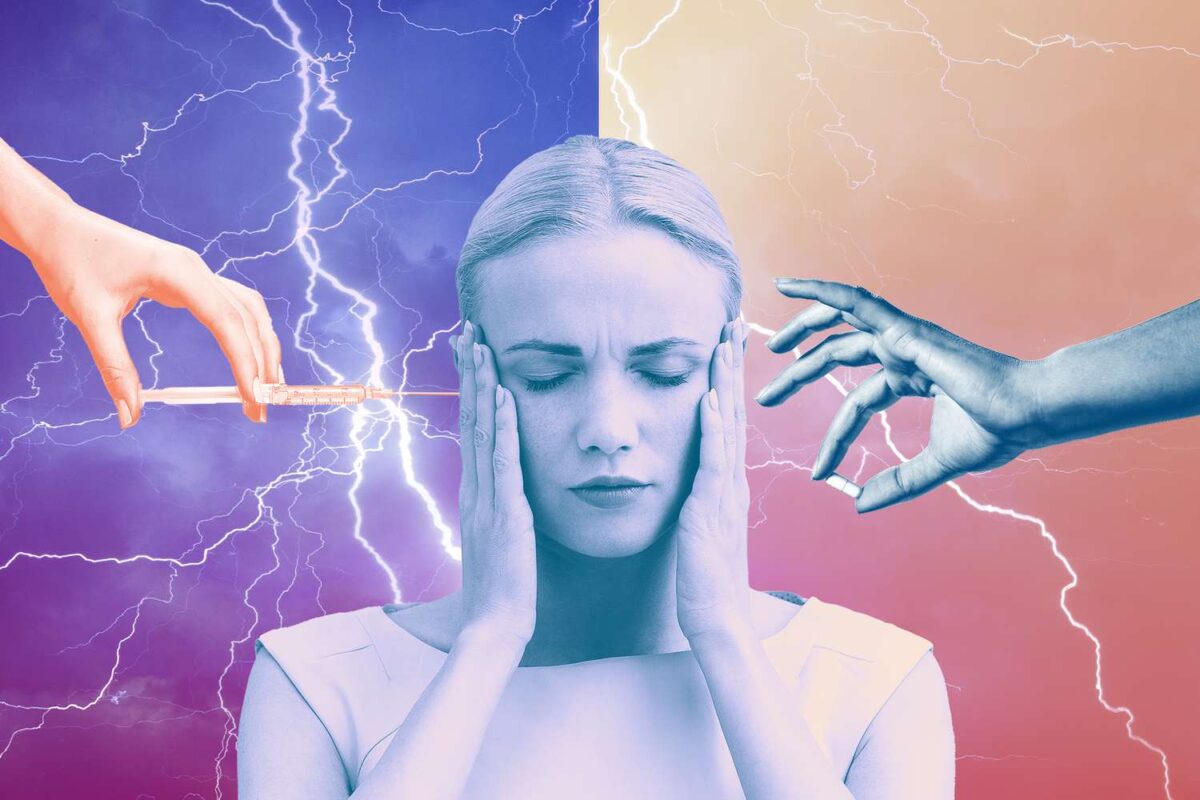Living with chronic migraines can be an arduous journey, often accompanied by debilitating symptoms that significantly impact daily life. This comprehensive guide delves into the intricate aspects of chronic migraines, shedding light on the symptoms, causes, and various treatment options available.
If you are experiencing chronic migraine, then you are surely navigating the treatment options that can be effective in treating the chronic migraine. Well, biological infusion therapy is one of the promising and revolutionary treatment ways to treat chronic migraine symptoms.
In this blog, you will get complete knowledge about chronic migraines and how different treatment options can help you overcome them. So, let’s continue to learn more:
Understanding Chronic Migraine Symptoms:
Beyond occasional headaches, chronic migraines present as recurrent occurrences lasting at least 15 days per month. People who suffer from chronic migraines frequently have pulsating pain on one side of their heads, feeling light- and sound-sensitive, and occasionally experiencing auras, which are visual distortions.
Unraveling the Mystery with Chronic Migraine ICD-10:
In the realm of medical coding, the International Classification of Diseases (ICD-10) plays a crucial role in identifying and classifying health conditions. Chronic migraine, coded under G43.71, is specifically earmarked in the ICD-10, providing healthcare professionals with a standardized system for diagnosis and billing.
Root Causes of Chronic Migraines:
Each person experiences chronic migraines for different reasons. In addition to genetics and family history, other important variables include stress, hormone fluctuations, specific diets, and environmental cues. Effectively managing and preventing persistent migraines requires an understanding of these triggers.
Treatment Options for Chronic Migraines:
Addressing chronic migraines involves a multi-faceted approach, combining lifestyle modifications, preventive measures, and acute treatments.
Lifestyle changes, including stress management, regular sleep patterns, and a balanced diet, can significantly reduce the frequency and severity of migraines.
Additionally, medications such as beta-blockers, antidepressants, and anti-seizure drugs may be prescribed to prevent chronic migraines.
In acute situations, pain relievers, triptans, and other prescription medications offer relief during a migraine episode. Botox injections have also emerged as a viable option for some individuals in managing chronic migraines.
The Ongoing Quest for Chronic Migraine Solutions:
New advances in migraine therapy are anticipated as long as research keeps going. With the development of novel drugs and neuromodulation tools, the field of managing chronic migraines is changing, offering hope to people looking for more specialized and potent treatments.
It is essential to have a thorough awareness of the signs, causes, and possible treatments for chronic migraine sufferers.
Understanding the intricacies of chronic migraines can help people work with medical specialists to create individualized plans for controlling and reducing the effects of this difficult ailment.
Being proactive is key to living a life free from chronic migraine disruptions, whether that means figuring out triggers, investigating preventive strategies, or keeping up with new treatment developments.
Biological Infusion Therapy – A Promising Treatment for Chronic Migraine
Biological infusion therapy has emerged as a promising and effective treatment option for chronic migraine, offering relief to individuals who have struggled with the debilitating impact of frequent and intense headaches. Here’s an exploration of how biological infusion therapy stands out as one of the best treatment options for chronic migraines:
Targeted Approach:
Biological infusion therapy takes a targeted approach by addressing specific molecules or receptors involved in the migraine process.
Monoclonal antibodies, a type of biological therapy, are designed to inhibit the activity of calcitonin gene-related peptide (CGRP), a neurotransmitter implicated in the development of migraines. This targeted approach minimizes side effects and focuses on the root cause of chronic migraines.
Reduced Frequency of Migraines:
Biological infusion therapy has been repeatedly demonstrated in clinical trials and real-world investigations to greatly reduce the frequency of migraine attacks in persons suffering from chronic migraines.
These treatments interrupt the migraine cascade by inhibiting CGRP or its receptors, which results in fewer and milder headache episodes.
Improved Quality of Life:
A person’s quality of life can be seriously impacted by chronic migraines, which can have an influence on social relationships, employment, and everyday activities.
Not only has biological infusion therapy been shown to lessen migraine frequency, but it has also been shown to enhance general well-being. Patients frequently report feeling more in control of their lives and having fewer disruptions to their regular routines.
Long-Lasting Effects:
The long-lasting effects of biological infusion therapy are among its noteworthy benefits. These infusions are given, depending on the prescription, at intervals of a few weeks to a few months, as opposed to some other medications that need to be taken frequently.
This may result in long-lasting relief, enabling people to enjoy longer periods of time free from the strain of recurrent migraines.
Minimal Side Effects:
Treatments using biological infusions have shown to have a good safety record with few negative effects.
This is especially helpful for people who have comorbidities that restrict their treatment options or who may have had problems with previous migraine treatments.
These treatments are generally more tolerable due in part to their focused nature.
Personalized Treatment Approach:
As with any medical intervention, the effectiveness of treatments can vary from person to person. Biologic infusion therapy allows for a more personalized approach, as healthcare providers can assess individual responses and adjust treatment plans accordingly. This flexibility is crucial in optimizing outcomes for patients with chronic migraines.
For chronic migraines, biological infusion therapy has shown to be a revolutionary treatment choice.
Its focused mode of action, capacity to lessen migraine frequency, and favorable influence on general quality of life make it an appealing option for people looking for long-lasting and efficient treatment for the difficulties presented by chronic migraines.
As research in this field continues, the landscape of migraine treatment is likely to evolve, offering even more hope for those affected by this condition.
Contact Fuse Infusion for Chronic Migraine Treatment
If your doctor has recommended biological therapy treatment for chronic migraine, we at Fuse Infusion offer you the best treatment services. We treat chronic migraine through medications, which are specialized biologics, and help our patients overcome this chronic disease.
Each Fuse Infusion patient receives direct care and treatment from our licensed professionals throughout biological infusion therapy, providing thorough medical management.
From start to end, each patient receives individualized care. When required, on-call medical professionals are accessible.
At Fuse Infusion, we believe in offering premium-quality services to our patients. So, contact us to receive a biological infusion today!

